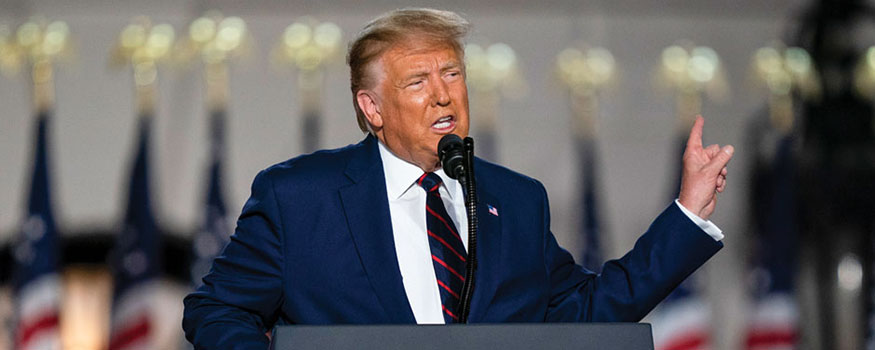The first presidential debate between President Donald J. Trump and former vice president and democratic presidential nominee Joseph Biden will be held at 9 p.m. Sept. 29 at Case Western Reserve University in Cleveland, Ohio. The University of Miami’s assistant director of debate offers his insights.
Incumbents beware! Jimmy Carter, Ronald Reagan, George W. Bush, and Barack Obama all lost the first debate during their re-election year. Whether it is hubris from having won before, the lack of time to prepare, or being surrounded by “yes people,” history is not kind to incumbents. To avoid this fate, President Donald J. Trump needs a poor debate performance from his democratic challenger, former vice president Joseph Biden, to cast doubt on Biden’s ability. And Trump must sell the narrative that the United States will move forward with him and backward with Biden.
Aggressive, not offensive: The easiest way for Trump to win the debate is for Biden to lose it. Biden’s performance must display that he cannot handle the presidency. Trump should focus on inducing a mistake from Biden. Although a decent debater, Biden can stumble. And at 77, there is concern about his performance. To rattle Biden, Trump should ratchet up pressure both before and during the debate to get the democratic presidential nominee to dwell on the enormity of the situation and to get inside Biden’s head.
Trump could try to be as aggressive as he can be, without being offensive. For example, Trump could push the envelope on some sensitive topics, such as Biden’s son Hunter’s alleged illegal dealings in Ukraine. If Trump can make Biden angry and make him react, that damages Biden’s narrative as a calm, empathetic leader. Even if Biden does not get visibly angry or react, these attacks could cause him to lose focus and slip elsewhere. A poor Biden performance reaffirms the narrative that he might not have what it takes and makes Trump look better by comparison.
Things can get better or worse: Trump cannot wish away the pandemic. Trump must face reality, be empathetic to the lives lost, and specifically talk about how he positively responded. Then, he should offer a hopeful narrative of the U.S. to voters. He should explain that, despite a once-in-a-lifetime pandemic, things are slowly getting back to normal and that only in Trump’s America will “the greatest economy” in the nation’s history return. The president should tout his accomplishments—tax cuts, trade deals, space policy, defeating the ISIS caliphate, etc.—and explain how and why they benefited the U.S.. Trump should offer an agenda and vision for the next four years. The Supreme Court vacancy gives Trump a newfound opportunity to make that case.
Trump knows that fear is a great motivator. He should contrast a resurgent Trump America with a dystopian Biden America. He should point out that Biden would be a risky and dangerous choice for president. Trump should repeat these themes often: socialism, law and order, China, immigration, and stock market. If Biden stumbles in the debate, Trump might offer that as proof that his opponent is a “puppet of left-wing extremists.” Fear on one side and hope on the other can be a powerful combination.
The outcome: For Trump to escape history and win the debate, he must goad Biden into faltering. Trump must convince voters that the U.S. will only continue to get better with him as president. We will find out soon if Trump can dodge history and join Bill Clinton as the only presidents who evaded the incumbency curse.
Patrick E. Waldinger is the assistant director of debate and a senior lecturer in the University of Miami School of Communication.
This article originally appeared at https://news.miami.edu/stories/2020/09/what-will-it-take-for-trump-to-win-the-upcoming-debate.html.







